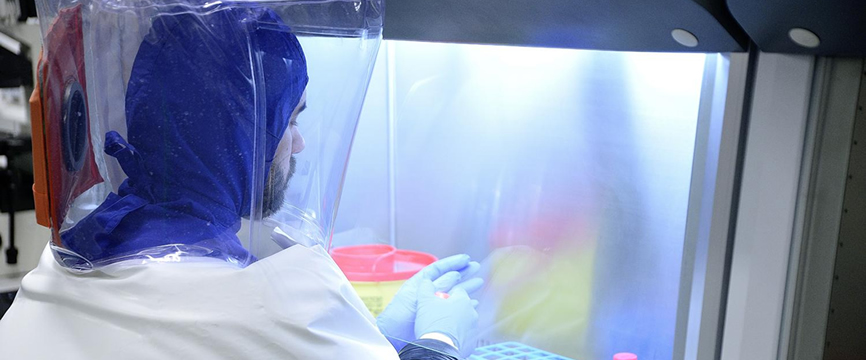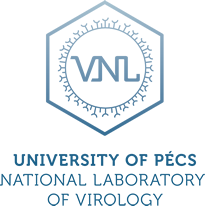

The global threat and spread of communicable diseases is a serious social and health risk for all nations. In addition to solving local problems, a common national and international approach is always needed. The aim of the National Laboratory of Virology is twofold: on the one hand, to increase the research performance and R&D activities of the complex virology laboratory unit of the Szentágothai János Research Centre of the University of Pécs (PTE-SzKK), and on the other hand, to unite virology research in Hungary and to build a Hungarian research network.
The laboratory builds on the existing outstanding virology laboratory facilities to carry out a wide range of basic and applied research experiments. This is partly to detect new emerging infectious diseases and to better understand the mechanisms of these and other known viral infections and, as a consequence, to develop more effective ways to protect against them. The experiments are mainly based on studies of the viral pathomechanisms of highly infectious viruses, starting from the analysis of viruses at the genomic level, through the cellular mechanisms of viral infection, to the development of antiviral therapies. The latter is very important, as one of the major challenges is to develop effective antiviral treatment or to discover mechanisms to inhibit viral replication at any level, so that we can protect ourselves against emerging infectious diseases in a timely and effective manner.
-
Viral Pathogenesis and Development of New Antiviral Drugs
-
Inhibition of Virus Replication via RNA Interference and Blocking Small Molecules
-
Discovery of New Viruses and Characterization of Emerging Diseases due to Climate Change and Human Activities
-
Study and Early Detection of Vector-Borne Diseases and Disease-Spreading Insects
-
Development of Diagnostic Procedures
-
Participation in Establishing National and Global Biodefense and Biosecurity Systems
-
Development and Testing of Epidemic Investigation and Prevention Systems
-
Advanced Viral Genomics Research and Development of Novel Methods
- Significant growth in both basic and applied research activities, strengthening collaborative capabilities, and increasing national and international recognition and acclaim.
- Support for Biotechnology Initiatives: Building on research foundations to support biotech startups, pharmaceuticals, healthcare industry, diagnostics, and vaccine corporations, as well as government sector R&D efforts.
- Integration of Socially Beneficial Research: Scientific advancement, successor training, and communication of research projects with significant societal benefits.
- Provision of Biodefense and Biosecurity Expertise in Hungary: Ensuring a continuous supply of professionals and scientific support for state, industrial, and scientific stakeholders in biodefense and biosecurity.
- Successor Training and Education: Contributing to undergraduate and postgraduate education and popularizing science from secondary education levels.
- Active Participation in National Scientific Mentor Programs: Engaging in mentorship to foster the next generation of scientists.
- Regional Leadership in Infectious Disease Research: Taking a proactive role in researching and mitigating infectious diseases and epidemics, with a focus on the Balkans and the Carpathian Basin.
- Global Engagement in Pandemic Protection: Participating in global research initiatives across continents to address strategic issues of pandemic protection, applying locally developed prevention solutions to manage high-risk pathogens.
Implementers
University of Pécs

A hazai kutatók nemzetközi beágyazottságát, kutatás-fejlesztési együttműködéseit nagymértékben elősegíti aktív kapcsolatuk a világ legjelentősebb kutatási infrastruktúráival (KI) és bekapcsolódásuk az ott folyó élvonalbeli kutatásokba. A legkorszerűbb KI-k olyan nagy költségű berendezések, létesítmények vagy adatbankok, amelyek építése, fejlesztése és működtetése meghaladja egy-egy ország gazdasági teljesítőképességét, így nemzetközi együttműködésben valósulnak meg.






 ENG
ENG

 Back
Back




